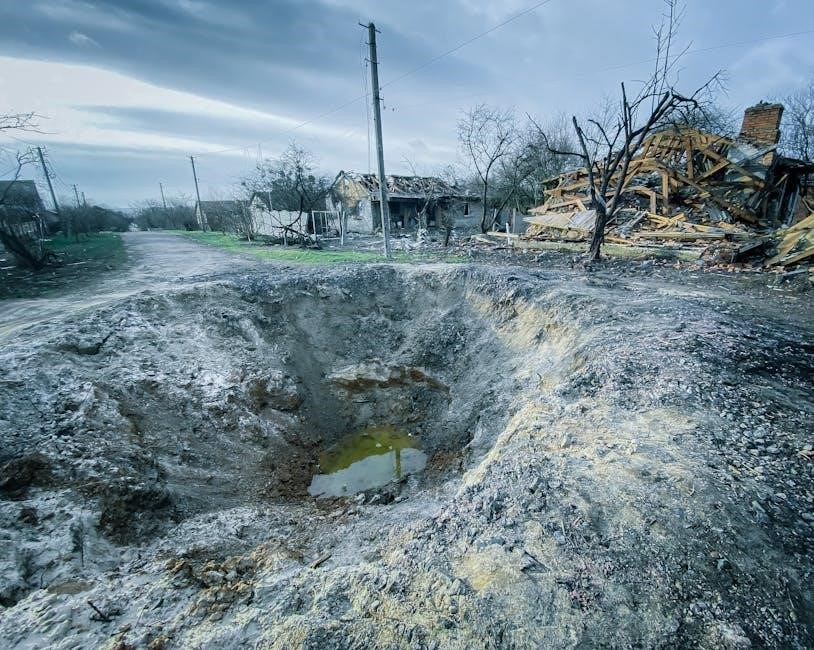The Power and Conflict Poetry Anthology explores themes of authority, struggle, and morality through works by poets like Shakespeare, Donne, and Browning, offering insights into human experiences.
Overview of the Anthology
The Power and Conflict Poetry Anthology is a thought-provoking collection of poems that delve into the complexities of power dynamics and conflict. It features works by renowned poets such as Shakespeare, Donne, and Browning, spanning different historical periods. The anthology explores themes of authority, personal and political struggles, and the ethical dilemmas arising from power. Through diverse poetic styles, it examines how power shapes human experiences and societal structures. This collection is designed to provoke reflection on the universal themes of conflict and control, offering insights into the human condition. It serves as a valuable resource for literary analysis, providing a deeper understanding of how poets have grappled with these enduring issues across centuries.
Historical Context of Power and Conflict
The Power and Conflict Poetry Anthology is deeply rooted in historical contexts that shaped the lives and works of its poets. From Shakespeare’s exploration of political intrigue during the Elizabethan and Jacobean eras to Donne’s metaphysical reflections amid the religious and social upheavals of the 17th century, the anthology captures the evolution of power dynamics across centuries. Similarly, Browning’s works resonate with the societal changes and feminist movements of the 19th century. Each poet’s unique historical backdrop influences their portrayal of power and conflict, offering readers a rich tapestry of perspectives. These historical contexts not only enrich the poems but also provide a lens to understand the enduring relevance of their themes.
Significance of the Anthology in Literary Studies
The Power and Conflict Poetry Anthology holds profound significance in literary studies as it provides a comprehensive exploration of power dynamics and conflict through diverse poetic voices. It serves as an essential tool for understanding how literature reflects and critiques societal structures, authority, and human struggles. The anthology bridges historical and contemporary perspectives, offering insights into universal themes that resonate across time. Its structured approach facilitates critical analysis, making it a valuable resource for educators and students. By examining power and conflict, the anthology enriches the literary canon, encouraging deeper exploration of human experiences and fostering a nuanced understanding of complex social and political issues.

Key Themes in Power and Conflict Poetry
The anthology explores power dynamics, authority, struggle, and morality, examining how these themes shape human experiences and societal structures through poetic expression and emotional depth.
The Nature of Power
The nature of power is a central theme in the anthology, exploring its complex and multifaceted forms. Poets examine how power is exercised, maintained, and challenged, revealing its dual potential for creation and destruction. Shakespeare’s works highlight authority and control, while Donne’s metaphysical insights delve into spiritual and emotional dominance. Browning’s poetry often portrays power through personal and political lenses, emphasizing the struggle for agency. The anthology illustrates how power shapes identities, relationships, and societal structures, offering profound reflections on its ethical implications. Through diverse perspectives, the poems reveal the universal relevance of power dynamics, making this theme a cornerstone of the collection’s exploration of human experience.
Conflict and Its Consequences
Conflict, as depicted in the anthology, serves as a catalyst for transformation and revelation. Poets explore its emotional, psychological, and societal impacts, illustrating how it shapes individual and collective identities. Shakespeare’s works often portray conflict as a test of authority, while Donne’s poetry delves into inner turmoil and spiritual struggles. Browning’s verses highlight the consequences of personal and political clashes, emphasizing resilience and change. The poems demonstrate that conflict, while destructive, can also lead to growth and understanding. This duality underscores the anthology’s exploration of human complexity, offering insights into the universal experiences of struggle and its aftermath.
Morality and Ethics in Power Dynamics
The anthology examines the intricate relationship between morality and power, questioning the ethical dimensions of authority. Poets like Shakespeare and Donne explore how power often corrupts, leading to moral ambiguity. Through their works, themes emerge of justice, guilt, and the struggle between right and wrong. Browning’s poetry, particularly in Aurora Leigh, delves into the ethical dilemmas faced by individuals in positions of power, highlighting the tension between personal values and societal expectations; The poems challenge readers to reflect on the consequences of unethical power dynamics, offering a nuanced exploration of morality in both personal and political contexts. This subtheme underscores the enduring relevance of ethical considerations in human interactions.

Major Poets and Their Contributions
Shakespeare, Donne, and Browning are central to the anthology, each offering unique perspectives on power and conflict through their masterful use of language and form.
William Shakespeare: Exploration of Authority
William Shakespeare’s works delve into the complexities of authority, revealing its dual nature as both a stabilizing force and a source of conflict. Through characters like kings, leaders, and lovers, Shakespeare examines how power is wielded, challenged, and maintained. In his sonnets and plays, authority is often intertwined with themes of love, ambition, and mortality, showcasing its transformative and destructive potential. Shakespeare’s exploration of authority is nuanced, reflecting the societal hierarchies of his time while also transcending them to resonate with universal human experiences. His mastery of language and dramatic structure allows readers to grapple with the ethical dilemmas and emotional tolls of power dynamics, making his contributions to the anthology profound and enduring.
John Donne: Metaphysical Insights into Power
John Donne’s poetry offers profound metaphysical explorations of power, blending philosophical inquiry with emotional depth. His works, such as “The Sun Rising,” use rich metaphors to examine control and dominance, often blurring the lines between personal and universal experiences. Donne’s unique voice challenges traditional notions of authority, presenting it as both a unifying and divisive force. His poetry frequently juxtaposes spiritual and earthly power, revealing the complexities of human relationships and the search for meaning. Through his intricate imagery and symbolic language, Donne invites readers to reflect on the interplay between individual agency and external forces, making his contributions to the anthology both intellectually stimulating and emotionally resonant.
Elizabeth Barrett Browning: Personal and Political Conflict
Elizabeth Barrett Browning’s poetry in the anthology delves into the interplay between personal and political conflict, often reflecting her own experiences and societal critiques. Her works, such as “Aurora Leigh,” explore themes of feminine power, identity, and the struggle against oppression. Browning’s poetry frequently addresses gender roles and the limitations imposed on women, blending emotional depth with sharp social commentary. Through her vivid imagery and strong female voices, she challenges traditional power structures and advocates for equality. Her unique ability to merge personal narratives with broader political issues makes her a pivotal figure in the anthology, offering readers a compelling perspective on power dynamics and human resilience.

Analysis of Specific Poems
This section delves into the exploration of power and conflict through specific poems, examining themes, poetic devices, and the unique perspectives of each poet on authority and struggle.
Shakespeare’s Sonnets: Power of Love and Authority
Shakespeare’s sonnets delve into the intricate dynamics of power, particularly through the lens of love and authority. In Sonnet 18, the speaker’s mastery of language asserts control over beauty and mortality, while Sonnet 130 subverts traditional notions of power by challenging idealized portrayals of love. These poems explore how love can both empower and undermine authority, reflecting broader societal hierarchies. Shakespeare’s use of metaphor and imagery reinforces themes of dominance and submission, often blurring the lines between romantic and political power. His sonnets remain a cornerstone of the anthology, offering profound insights into the interplay of love, authority, and human vulnerability, inviting readers to reflect on the enduring relevance of these themes in contemporary contexts.
Donne’s “The Sun Rising”: Metaphors of Control
In “The Sun Rising,” John Donne employs metaphysical imagery to explore themes of power and authority, particularly through the personification of the sun. The poem challenges traditional notions of control, as the speaker argues that their love surpasses the sun’s dominion. Donne’s use of metaphor, such as likening the sun to a “busy old fool,” underscores the tension between external authority and personal agency. The poem’s structure and rhythm reinforce this dynamic, with the speaker asserting mastery over their intimate world. This work exemplifies Donne’s ability to merge cosmic and human scales, highlighting the interplay of power and vulnerability in relationships. The poem remains a compelling study of control and resistance, resonating with the anthology’s focus on power dynamics.
Browning’s “Aurora Leigh”: Feminine Power and Struggle
Elizabeth Barrett Browning’s “Aurora Leigh” is a seminal work in the Power and Conflict Poetry Anthology, offering a profound exploration of feminine power and struggle. The poem follows Aurora Leigh, a strong-willed female poet, as she navigates personal and societal challenges. Browning uses Aurora’s journey to critique patriarchal norms and assert women’s intellectual and creative authority. Through vivid imagery and emotional depth, the poem portrays Aurora’s resistance against gendered constraints and her pursuit of artistic independence. The work is a powerful testament to the resilience of women in the face of systemic oppression, making it a cornerstone of feminist literary analysis within the anthology.

Poetic Devices and Techniques
Poets in the anthology employ imagery, metaphor, and symbolism to explore power dynamics, while rhythm and irony underscore conflict, enriching thematic depth and emotional resonance.
Imagery and Symbolism in Depicting Power
Poets in the anthology use vivid imagery and symbolism to explore power dynamics, with Shakespeare employing light and darkness to represent authority and corruption. Donne’s metaphysical imagery, such as the sun, symbolizes divine control. Browning’s natural imagery conveys the struggle for feminine power. These techniques create layered meanings, inviting readers to interpret power’s complexities. Symbolism often reflects societal hierarchies, while imagery evokes emotional responses, making power’s impact relatable. Through these devices, poets critique and examine power’s dual nature, emphasizing its transformative and destructive potential. The anthology’s rich symbolism and imagery provide a nuanced lens for understanding power’s role in human conflict and societal structures.
Irony and Satire in Conflict Narratives
Poets in the anthology employ irony and satire to critique power dynamics, often exposing hypocrisy and moral ambiguity. Shakespeare uses tragic irony to highlight flawed authority, while Donne’s metaphysical conceits subtly satirize earthly power. Browning’s verse often incorporates biting satire to challenge societal hierarchies. These techniques disrupt complacent narratives, inviting readers to question power structures. Irony underscores the gap between idealized authority and its flawed reality, while satire sharpens critiques of injustice. Through these devices, poets reveal the complexities of conflict, urging reflection on the ethical implications of power. Their works resonate with contemporary themes, making the anthology a powerful tool for exploring enduring societal issues.
Sound and Rhythm: Reinforcing Themes
Sound and rhythm in the anthology play a crucial role in reinforcing themes of power and conflict. Poets like Shakespeare and Donne use structured meters to mirror the order and hierarchy of authority. Shakespeare’s sonnets, with their iambic pentameter, evoke a sense of controlled power, while Donne’s metaphysical poems employ erratic rhythms to reflect the turmoil of inner conflict. Browning’s verse often disrupts traditional rhythms, mimicking the chaos of societal struggles. These sonic techniques heighten emotional intensity, drawing readers into the emotional depths of power dynamics. By aligning sound with sense, poets create a layered experience, where form and content intertwine to amplify the anthology’s central themes, making the exploration of power and conflict both visceral and profound.

Historical and Cultural Contexts
The anthology reflects diverse historical periods, from Shakespeare’s exploration of royal authority to Browning’s feminist perspectives, offering insights into how cultural movements shaped power dynamics and societal conflicts.

Power Structures in Shakespeare’s Time
During Shakespeare’s era, the monarchy and aristocracy held absolute power, shaping societal hierarchies. His plays, such as Macbeth and Henry IV, reflect this structure, exploring themes of authority, ambition, and legitimacy. The Elizabethan and Jacobean periods were marked by a rigid class system, with the crown at the apex and commoners at the base. Shakespeare’s works often critiqued and reinforced these power dynamics, illustrating the tensions between divine right and personal ambition. The historical context of his time influenced his portrayal of kingship, rebellion, and moral dilemmas, providing a lens to understand the interplay of power and conflict in both personal and political spheres.
Cultural Movements Influencing the Anthology
The Power and Conflict Poetry Anthology is deeply influenced by cultural movements such as the Renaissance, Metaphysical poetry, and Victorian era ideals. The Renaissance emphasized humanism and power dynamics, reflected in Shakespeare’s exploration of authority. Metaphysical poets like Donne introduced complex metaphors that critiqued societal hierarchies. The Victorian era’s focus on social justice and personal struggle is evident in Browning’s works, which highlight gender and political conflicts. These cultural shifts shaped the anthology’s themes, offering diverse perspectives on power and its impact on individuals and society. The interplay of these movements enriches the anthology’s exploration of human experiences and moral dilemmas.
Modern Interpretations of Historical Conflicts
Modern interpretations of historical conflicts in the Power and Conflict Poetry Anthology reveal fresh perspectives on timeless themes. Contemporary readers draw parallels between past struggles and current issues, such as gender inequality and political corruption. Poets like Shakespeare and Browning, whose works were rooted in their historical contexts, now resonate with modern audiences facing similar power dynamics. The anthology’s exploration of human resilience and moral ambiguity continues to inspire new analyses, highlighting the universal relevance of these poetic works. By bridging the gap between past and present, the anthology remains a vital tool for understanding both historical and contemporary conflicts.

Interpretation and Criticism
The anthology invites diverse interpretations, with critics analyzing power dynamics through feminist, postcolonial, and psychological lenses, revealing nuanced insights into authority, morality, and human conflict.
Feminist Critique of Power Dynamics
Feminist critics examine how the anthology portrays power dynamics, particularly focusing on gender roles and inequalities. Poets like Elizabeth Barrett Browning challenge patriarchal structures, emphasizing women’s struggles for autonomy and voice. Through their works, feminists highlight the intersection of personal and political conflicts, revealing systemic oppression. The exploration of feminine power and resistance offers a critical lens to understand historical and contemporary gender dynamics. This perspective enriches the anthology’s relevance, encouraging readers to reflect on the ongoing fight for equality and justice in society.
Postcolonial Perspectives on Conflict
Postcolonial critiques of the anthology reveal how power dynamics are shaped by colonial histories and cultural identities. Poets explore themes of oppression, resistance, and identity, reflecting on the legacy of colonialism. Works like Browning’s often highlight marginalized voices, challenging dominant narratives. This perspective examines how conflict arises from cultural clashes and power imbalances, emphasizing the need for decolonial thinking; By analyzing these poems, readers gain insights into the long-lasting impacts of colonialism on societies and individuals, fostering a deeper understanding of global conflicts and the struggle for justice and equality in postcolonial contexts.

Psychological Analysis of Power Struggles
The anthology invites a psychological exploration of power struggles, revealing the internal conflicts and emotional dynamics of individuals in authority. Poets like Shakespeare and Donne delve into the complexities of human psychology, exposing how power can corrupt and distort mental states. Browning’s works, for instance, highlight the emotional turmoil of personal and political conflicts, offering insights into the psychological toll of power imbalances. Through metaphor and imagery, these poems illustrate the tension between self-control and external pressures. This perspective allows readers to understand the deeper emotional and mental struggles underlying power dynamics, making the anthology a rich resource for studying human behavior and psychological responses to conflict.

Teaching and Studying the Anthology
Engaging with the anthology involves interactive learning, fostering critical thinking through discussion groups, and analyzing poetic devices to deepen understanding of power dynamics and human conflict.
Approaches to Teaching Power and Conflict
Teaching the anthology involves interactive seminars, fostering critical thinking through group discussions and debates. Instructors use case studies to contextualize historical and cultural influences on poetry. Emphasizing close reading techniques, educators guide students to analyze metaphors, imagery, and themes. Encouraging personal reflections helps students connect with the emotional depth of the poems. Integrating multimedia resources, such as audio recordings and visual aids, enhances engagement. Teachers also incorporate writing exercises, allowing students to express their interpretations creatively. Formative assessments, like peer reviews and presentations, promote collaborative learning. By linking literary analysis to real-world issues, educators help students appreciate the anthology’s relevance to contemporary societal challenges and power dynamics.
Student Engagement Strategies
Engaging students with the anthology involves dynamic strategies such as group discussions, debates, and role-playing activities to explore power dynamics. Encouraging creative responses, like writing personal poems or creating visual art, fosters deeper connections. Technology integration, such as online forums or interactive quizzes, enhances participation. Connecting poems to contemporary issues or students’ lives increases relevance. Providing choice in assignments, like selecting specific poems for analysis, empowers learners. Incorporating multimedia, such as audio recordings or videos, enriches understanding. Collaborative tasks, like group presentations, promote teamwork and shared insights. Regular feedback and reflection opportunities help students track their progress. These approaches ensure students remain actively involved and invested in exploring the themes of power and conflict.
Assessment Methods for Poetry Analysis
Assessment methods for poetry analysis in the Power and Conflict Anthology include essays, presentations, and quizzes to evaluate comprehension and critical thinking. Close reading exercises and comparative analysis tasks encourage deeper engagement. Peer reviews and group discussions foster collaborative learning and diverse perspectives. Reflective journals and creative responses, such as writing personal poems, allow students to demonstrate understanding uniquely. Standardized tests and oral exams assess retention and analytical skills. Digital tools, like online quizzes, provide immediate feedback. Portfolios and project-based assessments track progress over time. These methods ensure a comprehensive evaluation of students’ ability to interpret and connect with the anthology’s themes of power and conflict.
The Power and Conflict Poetry Anthology remains a vital resource for exploring human experiences, offering timeless insights into authority, struggle, and morality through its diverse poetic voices.
Final Thoughts on the Anthology’s Relevance
The Power and Conflict Poetry Anthology remains a cornerstone of literary studies, offering profound insights into human experiences through its exploration of authority and struggle. Its timeless themes resonate across generations, making it a vital tool for understanding historical and contemporary societal dynamics. The anthology’s ability to provoke reflection on morality and ethics ensures its continued relevance in both academic and personal contexts. By examining the works of poets like Shakespeare, Donne, and Browning, readers gain a deeper understanding of power’s complexities and conflict’s enduring impact on humanity. This anthology is not just a collection of poems; it is a mirror held to the human condition, revealing universal truths that transcend time and culture.
Impact on Contemporary Literature
The Power and Conflict Poetry Anthology has profoundly influenced contemporary literature by inspiring poets and writers to explore themes of authority, struggle, and moral ambiguity. Its rich exploration of power dynamics and conflict continues to resonate in modern works, encouraging authors to delve into political, social, and personal struggles. The anthology’s emphasis on universal human experiences has made it a benchmark for understanding the complexities of power and its consequences. Many contemporary poets draw inspiration from the anthology’s nuanced portrayal of conflict, integrating similar themes into their work. As a result, the anthology remains a foundational text, shaping the way modern literature engages with issues of power and conflict.
Encouraging Further Exploration
The Power and Conflict Poetry Anthology serves as a dynamic educational tool, inspiring deeper exploration of its themes and poets. Educators often use it to foster critical thinking and empathy, encouraging students to analyze historical and cultural contexts. The anthology’s relevance extends beyond academia, prompting readers to reflect on personal experiences with power and conflict. Its verses also invite interdisciplinary connections, linking literature to history, psychology, and sociology. By exploring additional resources like essays, analyses, and modern reinterpretations, readers can gain a richer understanding of the anthology’s themes; This enduring collection continues to inspire new generations, making it a vital starting point for further literary and cultural exploration.
